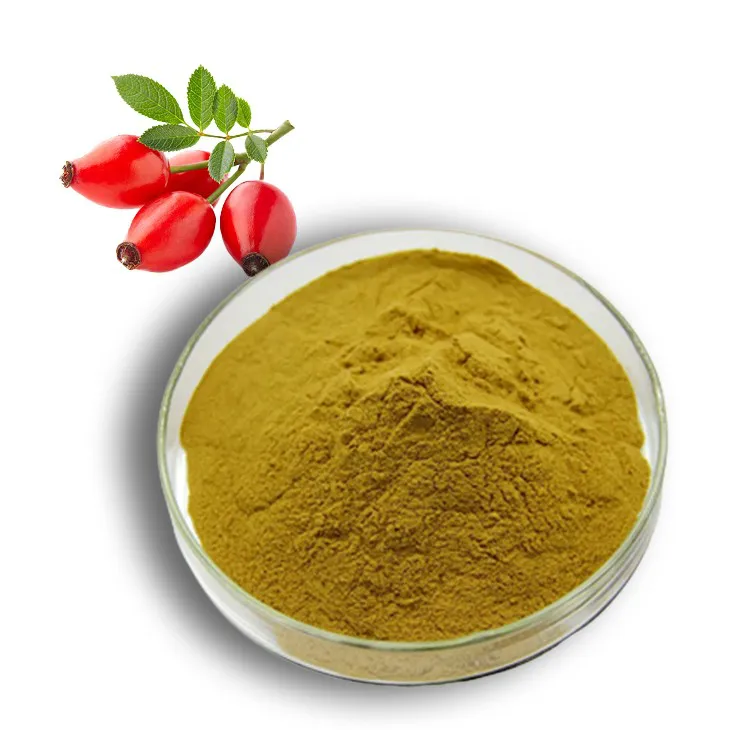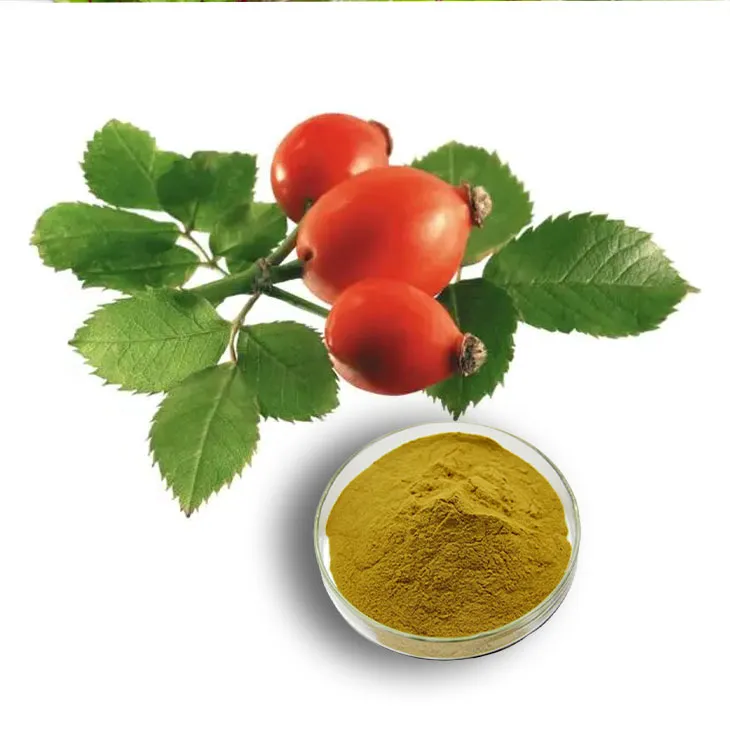- 0086-571-85302990
- sales@greenskybio.com
Using rose hip extract? Make sure you source from sustainable suppliers!
2024-12-11

1. Introduction
Rosehip extract has been making waves in a variety of industries, from cosmetics to food and pharmaceuticals. Its rich nutritional profile, including high levels of vitamin C, antioxidants, and essential fatty acids, has made it a sought - after ingredient. However, as the demand for Rose Hip Extract grows, it is imperative that we consider the source of this valuable resource. Sustainable sourcing is not just a trendy concept but a necessity for the long - term viability of the rose hip industry and for the well - being of our planet and its people.

2. The Importance of Sustainable Sourcing
2.1 Environmental Protection
Rose hips are typically sourced from wild plants or cultivated in specific regions. When not sourced sustainably, the over - harvesting of wild rose hips can have a significant impact on the local ecosystem. For example, it can disrupt the natural balance of plant and animal species. Unsustainable harvesting may also lead to soil degradation, as plants are removed without proper management of the land. In some cases, it can cause a decline in pollinator populations, as their habitats are affected.
On the other hand, sustainable suppliers often employ practices that protect the environment. They may use organic farming methods, which avoid the use of harmful pesticides and fertilizers. This helps to maintain soil health and water quality. Sustainable harvesting techniques, such as selective picking, ensure that the plants can continue to reproduce and thrive in their natural habitats.
2.2 Fair Trade for Local Communities
Many regions where rose hips are sourced are home to local communities that rely on the income from harvesting and selling these products. When suppliers are sustainable, they are more likely to engage in fair trade practices. This means that the local harvesters are paid a fair wage for their work.
For instance, in some developing countries, women are often the main harvesters of rose hips. Sustainable sourcing ensures that these women are not exploited and are able to support their families. Fair trade also promotes community development, as a portion of the revenue may be reinvested in local infrastructure, education, or healthcare.
2.3 High - Quality Products
Sustainable suppliers are more likely to follow strict quality control measures. They understand that maintaining the integrity of the Rose Hip Extract is crucial for their business. This includes proper handling and processing of the raw materials.
For example, they may ensure that the rose hips are harvested at the optimal time to maximize the nutritional content of the extract. They also use clean and hygienic processing facilities, which reduces the risk of contamination. High - quality Rose Hip Extract is not only more effective for its intended uses but also builds trust with consumers.

3. How to Identify Sustainable Suppliers
3.1 Certifications
One of the most reliable ways to identify a sustainable supplier is through certifications. Look for suppliers that have certifications such as organic, fair trade, or sustainable forestry certifications (if applicable).
- Organic Certifications: These indicate that the rose hips are grown without the use of synthetic pesticides, fertilizers, or genetically modified organisms (GMOs). Examples of well - known organic certifications include USDA Organic in the United States and EU Organic in Europe.
- Fair Trade Certifications: Suppliers with fair trade certifications adhere to principles that ensure fair wages and working conditions for local harvesters. Fairtrade International is a widely recognized fair trade certifier.
- Sustainable Forestry Certifications: If the rose hips are sourced from forest - grown plants, certifications like FSC (Forest Stewardship Council) can indicate that the forest is being managed in a sustainable way.
3.2 Transparency in the Supply Chain
A sustainable supplier should be transparent about their supply chain. They should be able to provide information about where the rose hips are sourced, how they are harvested, and how they are processed.
For example, they may have a traceability system in place that allows you to track the origin of the rose hip extract from the field to the final product. This transparency helps to build trust and ensures that there are no unethical or unsustainable practices hidden in the supply chain.
3.3 Supplier's Reputation
Research the supplier's reputation in the industry. Look for reviews and testimonials from other customers. You can also check if the supplier is a member of industry associations or organizations that promote sustainability.
For example, if a supplier has a long - standing reputation for quality and sustainability, it is more likely to be a reliable source. On the other hand, if there are numerous complaints about a supplier's unethical practices or low - quality products, it is best to avoid them.
3.4 Environmental and Social Policies
Ask the supplier about their environmental and social policies. A sustainable supplier should have clear policies in place to protect the environment and support local communities.
For example, their environmental policy may include goals for reducing waste, conserving water, and using renewable energy sources. Their social policy may focus on promoting education and healthcare in the local communities where they source their rose hips.

4. Challenges in Sourcing from Sustainable Suppliers
4.1 Higher Costs
Sourcing from sustainable suppliers may sometimes come with a higher price tag. This is because sustainable practices often require more investment in terms of labor, environmental protection, and quality control.
For example, organic farming methods may require more manual labor for weed control and pest management, which can increase the cost of production. However, it is important to consider the long - term benefits of sustainable sourcing, such as environmental protection and building a positive brand image.
4.2 Limited Availability
In some cases, sustainable rose hip extract may be less readily available compared to non - sustainable sources. This could be due to a smaller number of suppliers or lower production volumes.
However, as the demand for sustainable products grows, more suppliers are likely to enter the market. It is also possible to work with suppliers to plan ahead and ensure a stable supply of sustainable rose hip extract.
4.3 Verification Difficulties
Verifying that a supplier is truly sustainable can be challenging. There may be cases of false certifications or suppliers making unsubstantiated claims.
To overcome this, it is important to do thorough research, ask for detailed documentation, and even conduct on - site inspections if possible. Industry associations and regulatory bodies can also play a role in ensuring the authenticity of sustainability claims.
5. Conclusion
Rosehip extract offers numerous benefits, but it is essential to source it from sustainable suppliers. Sustainable sourcing protects the environment, supports local communities, and ensures high - quality products. While there are challenges in identifying and sourcing from sustainable suppliers, the long - term benefits far outweigh the short - term difficulties. By taking the time to research and choose sustainable suppliers, companies and consumers can contribute to a more sustainable future for the rose hip industry and the planet as a whole.
FAQ:
Q1: Why is it important to source rose hip extract from sustainable suppliers?
It is important because sustainable sourcing of rose hip extract helps in environmental protection. It also ensures fair trade for local communities involved in the production. Moreover, sustainable suppliers are more likely to provide high - quality products.
Q2: How can one identify sustainable suppliers of rose hip extract?
One can start by looking for certifications such as Fair Trade certifications. Research on the supplier's farming practices to see if they are environmentally friendly, like using sustainable farming methods that reduce chemical use and protect natural habitats. Check if the supplier has a good reputation among other businesses in the industry and if they are transparent about their supply chain.
Q3: What are the environmental benefits of sourcing rose hip extract sustainably?
Sustainable sourcing can help preserve the natural habitats where rose hips grow. It can prevent over - harvesting, which could otherwise disrupt the ecosystem. Also, sustainable farming methods used by these suppliers often reduce soil erosion, conserve water, and protect biodiversity.
Q4: How does sustainable sourcing of rose hip extract benefit local communities?
When sourced sustainably, local communities involved in the production get fair compensation for their work. This helps in improving their economic situation. It also promotes the long - term viability of their livelihoods as the industry can continue to thrive in a sustainable manner without exploiting them.
Q5: Are sustainable suppliers more expensive?
Not necessarily. While some may assume that sustainable products come with a higher price tag, in the long run, sustainable suppliers can offer cost - effective solutions. They may have better quality control, which reduces waste and inefficiencies. Also, as the demand for sustainable products grows, the economies of scale can bring the prices down.
Related literature
- Sustainable Sourcing of Botanical Extracts: A Case Study of Rose Hip"
- "The Importance of Sustainable Suppliers in the Rose Hip Extract Industry"
- "Environmental and Social Impacts of Rose Hip Extract Sourcing: The Role of Sustainability"
- ▶ Hesperidin
- ▶ citrus bioflavonoids
- ▶ plant extract
- ▶ lycopene
- ▶ Diosmin
- ▶ Grape seed extract
- ▶ Sea buckthorn Juice Powder
- ▶ Beetroot powder
- ▶ Hops Extract
- ▶ Artichoke Extract
- ▶ Reishi mushroom extract
- ▶ Astaxanthin
- ▶ Green Tea Extract
- ▶ Curcumin Extract
- ▶ Horse Chestnut Extract
- ▶ Other Problems
- ▶ Boswellia Serrata Extract
- ▶ Resveratrol Extract
- ▶ Marigold Extract
- ▶ Grape Leaf Extract
- ▶ blog3
- ▶ blog4
- ▶ blog5
-
Pure 85% Tomentil Extract.
2024-12-11
-
Ginger Extract
2024-12-11
-
Sea buckthorn oil
2024-12-11
-
Bamboo Leaf extract
2024-12-11
-
Reishi mushroom extract
2024-12-11
-
Bayberry Extract
2024-12-11
-
Phellodendron Extract
2024-12-11
-
Aguaje Extract
2024-12-11
-
Lotus leaf extract
2024-12-11
-
Pine bark Extract Powder
2024-12-11
-
Almond Extract Powder
2024-12-11





















